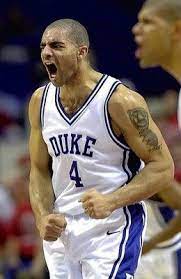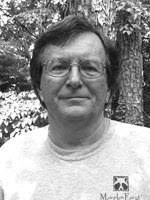The NBA Finals date back to 1947 (when they were known as the Basketball Association of America Finals) and the very 1st NCAA tourney was held in 1939. Olympic basketball competition is even older: it debuted as a demonstration event in 1904 and the men’s version became a medal sport in 1936, with the women finally getting their chance to go for the gold in 1976. The United States has dominated Olympic basketball competition from the start: the men have won 16 gold medals in the 19 tournaments they have participated in during the past 85 years, while the women have won 9 gold medals in the 11 tournaments in which they have competed during the past 45 years. HoopsHD’s Jon Teitel continues his coverage by chatting with Jim Sumner (columnist for Go Duke: The Magazine and Duke Basketball Report) about Carlos Boozer winning the 2001 NCAA title and a pair of Olympic medals.
Boozer was born in Germany and raised in Alaska (where he won back-to-back state titles): what made him choose Duke? I cannot really speak to why he chose Duke but I can provide some context. Obviously, Boozer did not have any local options while prepping in Juneau but was well known for his play on the AAU circuit. He was nationally recruited and UCLA was long regarded as the leader for his services. During Boozer’s senior year in high school Elton Brand was named national POY while only a sophomore at Duke. Boozer was good enough to wait it out without anyone pulling an offer. When Brand announced that he was going to the NBA and Chris Burgess announced he was transferring to Utah, the door was wide open for Boozer to come in and start. Duke had long since signed Jason Williams and Mike Dunleavy Jr. so Boozer knew that the talent cupboard would still be full.
He was part of a great recruiting class in the fall of 1999: what were the expectations like for him and his 3 fellow McDonald’s All-Americans (Dunleavy/Casey Sanders/Williams)? Prior to 1999 Duke had never lost a player early to the NBA. Following that 37-2 season, Brand/Corey Maggette/William Avery all left early, Burgess transferred, and Trajan Langdon/Taymon Domzalski graduated. Only Shane Battier, Chris Carrawell, and Nate James returned from that team; Matt Christensen was redshirted after an LDS mission but came back in 2000. So, everyone knew that the freshmen would have to be ready to contribute from day one. Past players as talented as Danny Ferry/Christian Laettner/Battier had been able to ease into college ball but Williams/Dunleavy/Boozer did not have that luxury. Duke was ranked 10th in the preseason AP poll so it is not like they came out of nowhere, but I think it is safe to say that they exceeded expectations.
Take me through the 2001 NCAA tourney:
After a 2-PT OT win at Maryland in January (which included a comeback from a 10-PT deficit with 54 seconds left in regulation), he had to leave the rematch in February with a foot injury, missed the ACC semifinal 2-PT win over the Terps while rehabbing his injury, then scored 19 PTS in a win over Maryland in the Final 4 (which included a comeback from a 22-PT deficit, the largest comeback in Final Four history): what are your memories of that intense 4-games-in-9-weeks rivalry? We need to go back to February 27: the last home game, and Senior Day, for Battier and James. Duke had beaten Maryland in College Park in overtime earlier in the season after a great late-game comeback. Duke was ahead when Boozer broke his right foot and Cameron went absolutely silent: like hear-a-pin-drop silent. There was no guarantee that he could return for the end of the season but the Duke medical staff, coaching staff, and Boozer himself did everything right. It was the perfect balance between rest, treatment, and conditioning. Duke had gone smaller/quicker without Boozer, which gave lots more time to freshman guard Chris Duhon, and they won the ACC Tournament without Boozer. Duke beat Maryland on a late tip-in by James at the buzzer in the ACC semifinals (www.youtube.com/watch?v=uA-GiUc20DM), routed North Carolina in the title game, then had to readjust to Boozer’s return in the NCAA tourney. What most people remember about the Duke-Maryland game in the Final Four is Coach Krzyzewski responding to the deficit by telling his team that he was not going to call any more plays, but simply let his team freelance: that played more to the strengths of Battier/Williams/Dunleavy/Duhon. Maryland had a lot of size on that team (center Lonnie Baxter was a beast) and they were abusing Duke on the boards. Boozer changed that barely a month after breaking his foot and deserves a large part of the credit for that win.
He had 12 PTS/12 REB in a 10-PT win over Arizona in the title game: what did it mean to him to win a title? Arizona also had lots of size, starting 7’1” Loren Woods and 250-pounder Michael Wright. Boozer did not start but came off the bench and played 30 solid minutes, helping Duke neutralize Arizona’s size advantage and allowing Battier/Williams/Dunleavy to dominate on the perimeter.
Where does that 2001 Duke team (which set NCAA records by winning 133 games over a 4-year period and making 407 3-PT shots) rank among the greatest in school history, and how on earth did they lose to Indiana in the 2002 Sweet 16 after being favored by 13 PTS? The 2001 team could rank as high as second in Duke annals behind the 1992 NCAA title team that went 34-2 with Laettner/Bobby Hurley/Grant Hill. The 2002 team was not the same team because Battier/James had graduated. Battier was consensus national POY and James was an All-ACC player, but they were also among the best leaders that Krzyzewski has ever had. Duke jumped out to a big lead over Indiana in the Sweet Sixteen but did not respond well to IU’s physicality. Duke had six future NBA players on that team while Indiana only had one (Jared Jeffries). IU simply outworked Duke down the stretch of that game and Duke missed the leadership of guys like Battier/James.
In 2002 he was named All-American/1st-team All-ACC/ACC tourney MVP: what did it mean to him to receive such outstanding honors? Boozer/Dunleavy/Williams were all named 1st-team All-ACC that year, which was the first time that any school had three 1st-team All-ACC selections, and UNC duplicated that feat in 2012 with Tyler Zeller/John Henson/Harrison Barnes. Nobody else has done that…and with 15 teams in the league it is hard to imagine it ever happening again (barring a contraction of teams).
In April of 2002 he declared for the NBA draft, then was selected 35th overall by Cleveland: why did he decide to leave school early, and were people 2nd-guessing him after he was not taken in the 1st round? Nobody at Duke was surprised when he decided to leave after the 2002 season. Most people expected him to go in the first round but he was a little shorter than expected, without a great wingspan/vertical leap or other similar measurables. Obviously, lots of GMs and draft evaluators whiffed on this one so I assume that it was a motivator.
He won a bronze medal with team USA at the 2004 Olympics and a gold medal with team USA at the 2008 Olympics: what did it mean to him to represent his country, and what did it mean to him to win a pair of medals? I am sure that it was a career highlight to be a member of the 2008 “Redeem Team”, especially since he got to play for his old college coach, but it is not something that we have ever discussed.
He was a 2-time All-Star, made the playoffs for 8 straight years from 2007-2014, and remains top-80 in NBA history with 52.1 FG%/9.5 RPG: where does he rank among the greatest NBA big men in Duke history? Pretty high. He is definitely behind Brand, and Laettner was an All-Star before suffering a serious Achilles injury. Mike Gminski (pre-Krzyzewski) was a pure center, while most of the other Duke 5s we are discussing became NBA 4s. Boozer had a better NBA career than many other first-round picks (such as Alaa Abdelnaby/Cherokee Parks/Shelden Williams/Miles Plumlee/Mason Plumlee) so he definitely played above his draft slot.
When people look back on his career, how do you think that he should be remembered the most? Boozer was a blue-collar, back-to-the-basket, beneath-the-rim kind of player. He never made a 3-pointer at Duke and did not have a lot of spectacular dunks/blocks. He was never even the best player on any of his college teams: Carrawell was ACC POY in 2000, Battier was consensus national POY in 2001, and Williams was national POY in 2002. He did not make a lot of highlight-reel plays but was surrounded by people who did, so it was easy for him to slip under the radar. However, Boozer made 63.1% of his field goal attempts, which remains the highest percentage in Duke history (Zion Williamson shot 68 FG% but did not get enough attempts) and is an extraordinary accomplishment. Duke won games with him at center, lots of them, so that is a pretty good legacy.




